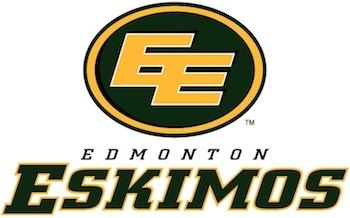Image Caption
By Shari Narine
Sweetgrass Contributing Editor
EDMONTON
October 18, 2016.
“We’re long overdue to speak,” said Len Rhodes, president and CEO of the Edmonton Eskimos football club.
The Eskimos were drawn into the spotlight Monday when Toronto Mayor John Tory, former Canadian Football League commissioner, said the reigning Grey Cup champs could do with a name change. Tory’s comment followed the Ontario Superior Court’s decision to dismiss an application for an injunction against the use of the Cleveland Indians’ name and logo. The Cleveland team is presently playing the Blue Jays in Toronto.
As far as Rhodes is concerned there is no direct comparison between the Indians’ situation and that of the Eskimos.
“We’ve done it with respect and that for us is so important,” he said. “Our logo doesn’t have caricatures, doesn’t have cartoons, doesn’t depict anyone in a negative way.”
The community-owned Edmonton Eskimos green and gold logo consists of two joining ‘E’s.
However, Rhodes didn’t go as far as to call for the Cleveland Indians to do away with their name or logo.
Rhodes also didn’t say whether there had been any serious discussion internally about changing his team’s name. The Edmonton football club has been the Eskimos since it was founded in 1949. It is also the most successful franchise in the CFL.
There is precedent to change a club’s name, Rhodes acknowledges. The Ottawa REDBLACKS have previously been the Roughriders and the Renegades.
“We use the team name Edmonton Eskimos with so much pride because we feel it’s a reflection of the people of the north and it really marries well with the values of the Inuit community and people across northern Alberta, in general. When you talk about being in the north, there’s no doubt you’re talking about perseverance, determination and courage because those are values we think are just fabulous,” he said.
Rhodes says he did discuss the name of the club with Natan Obed, president of the Inuit Tapiriit Kanatami. Obed contacted Rhodes shortly after the Eskimos won the Grey Cup last year and Obed, at Rhodes invitation, flew to Edmonton and the two talked for a “few hours.”
“He shared his point of view in terms of our name, asking us to change it and we gave a little background on our football club … that we do so much to try and show respect to all citizens across northern Alberta and throughout the country. We thought that was going to be a great step as a first step in the dialogue taking place in building a relationship,” he said.
Rhodes holds there’s no “strong consensus” within the Inuit community as to whether the name should be changed. He said Peter Irniq, the second Commissioner of Nunavut from 2000 to 2005, said he was proud that the team was associated with his heritage.
“Everyone’s allowed to have a different opinion and that’s a beautiful thing in a democracy,” said Rhodes.
He also noted that a trip with the Grey Cup to Yellowknife about a month ago resulted in a lot of happy locals getting their photographs snapped with the CFL trophy.
“It was a joyous celebration and one that I always approach with pride, but also with respect to the overall community,” said Rhodes.
Irregardless, Beverly Allard, president of the Aboriginal Congress of Alberta Association, which represents urban Aboriginal peoples, including the southern Inuit, says it’s time for a name change – or at least an open discussion.
“I understand from the perspective of those folks, who have been providing their undying support to that organization for a long time. There are somethings that are just sort of things you want to hold on to, but in today’s day and age, I think that there are certain sensitivities that one really needs to take into consideration,” said Allard. “It’s really about giving recognition about being respectful and doing the good thing.”
“We’re always listening to what people have to say on a topic and at this point of time we have no plans to make a change to our name. But we continue to have discussions with people on that topic and any other topic,” said Rhodes.
The court challenge against the Cleveland Indians was brought by Siksika member, activist and architect Douglas Cardinal.
Cardinal’s attorney, Michael Swimwood, said it followed a conversation he and his client were having about recent suicides in Lac La Ronge and Stanley Mission. He said they received a phone call from an associate wondering if they would be interested in advancing an action against the Cleveland baseball team for their logo and name.
“We were primed, right then and there. We thought it would be an opportunity to begin a dialogue around racism,” said Swimwood. “He and I agreed together about six months ago there’s a need for us to start talking about genocide and apartheid and we have to up the dialogue and have people begin to understand that they have to face these things because that’s essentially the plight of people on reserves.”
While the court-injunction was denied, the merits have not yet been decided, says Swimwood, who notes Cardinal also has complaints of racial discrimination filed with Ontario's Human Rights Commission and the Canadian Human Rights Commission. Those decisions won’t be rendered for at least six months, he says.
Swimwood adds that Cardinal is not pleased with the Edmonton Eskimos team name either.
“What we’re hoping is that this will have a domino effect. It’s time that we raised these issues because there’s all sorts of sports team from pro-leagues on down where there’s the appropriation of the culture and it needs to stop,” said Swimwood.

